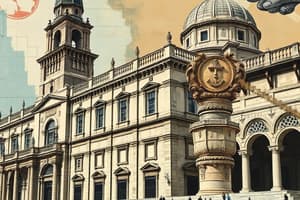Podcast
Questions and Answers
What does astrology study?
What does astrology study?
- The belief in supernatural beings
- The influence of planets, stars, and comets on daily life (correct)
- The governance of city-states
- The transformation of urban atmospheres
Which term refers to the supreme power and authority of a political unit?
Which term refers to the supreme power and authority of a political unit?
- Despotism
- Oligarchy
- Republicanism
- Sovereignty (correct)
What is an oligarchy?
What is an oligarchy?
- The rule of the nobility over common citizens
- Rule by a single leader with absolute power
- A system where power is held by a few individuals (correct)
- A government where citizens vote directly on laws
What is a guild?
What is a guild?
What is the role of the papacy?
What is the role of the papacy?
What historical period is known for the revival of classical art, architecture, literature, and learning?
What historical period is known for the revival of classical art, architecture, literature, and learning?
Which term refers to the political-economic-social system of landholding in Europe during the Middle Ages?
Which term refers to the political-economic-social system of landholding in Europe during the Middle Ages?
What was the primary religious reference for Judaism?
What was the primary religious reference for Judaism?
Who is considered the founder of Islam as revealed in the Koran?
Who is considered the founder of Islam as revealed in the Koran?
In a hierarchical class structure, who is typically at the bottom?
In a hierarchical class structure, who is typically at the bottom?
Which term describes a formal agreement to cooperate between parties?
Which term describes a formal agreement to cooperate between parties?
What instrument was historically used to measure the locations of stars and planets for navigation?
What instrument was historically used to measure the locations of stars and planets for navigation?
During which historical period did the Byzantine Empire exist?
During which historical period did the Byzantine Empire exist?
Flashcards are hidden until you start studying
Study Notes
Renaissance and Historical Context
- Originated in Italy during the 14th century, marking a revival of classical art, architecture, literature, and learning.
- Transitioned from the Middle Ages, a period from the 4th to the 14th centuries characterized by the decline of the Roman Empire.
Key Historical Terms
- CE (Common Era): System of year numbering based on the birth of Jesus Christ, widely accepted globally.
- Era: Defined as a specific period in history, marked by notable events or developments.
- Byzantine Empire: Successor of the Roman Empire in the east, existing from the 4th to the 15th centuries.
Major Religions
- Judaism: Monotheistic faith of the Jews centered on the belief in one God, primarily described in the Hebrew Bible.
- Christianity: Based on the teachings of Jesus and the Old and New Testament, emphasizing belief in one God.
- Islam: Monotheistic faith founded on the teachings of Muhammad and the revelations in the Koran.
Feudal System and Governance
- Describes a political-economic-social structure prevalent in the Middle Ages, with a rigid hierarchical class system.
- Monarchs held the greatest power, followed by clergy and nobles, knights, lower clergy, and serfs, who were the majority yet held the least power.
- The system was characterized by landholding and the relationships between different social classes.
Political Structures
- Oligarchy: Government form where control rests with a small group of influential individuals.
- Republic: Political state where power resides with the population or their elected representatives.
- Despotism: Rule by a leader with absolute power, often viewed as oppressive.
Social and Economic Aspects
- Urbanization: Movement of people from rural areas to cities, changing demographic patterns and social structures.
- Guild: Organizations formed by craftsmen or merchants to regulate their trades and maintain standards.
- Aristocracy: Social class consisting of nobles or individuals with inherited titles.
Cultural Contributions
- Fresco: A technique of mural painting on wet plaster, commonly used in Renaissance artworks.
- Basilica: Significant Roman Catholic cathedrals known for their architectural and historical importance.
Miscellaneous Concepts
- Diplomacy: Art of negotiating and managing relationships, particularly in government and international affairs.
- Pilgrim: Individuals who travel to sacred sites for religious reasons, often part of significant historical events such as the Crusades.
- Astrology: Study of celestial bodies and their influence on human affairs, widely practiced in the Renaissance era.
Studying That Suits You
Use AI to generate personalized quizzes and flashcards to suit your learning preferences.




